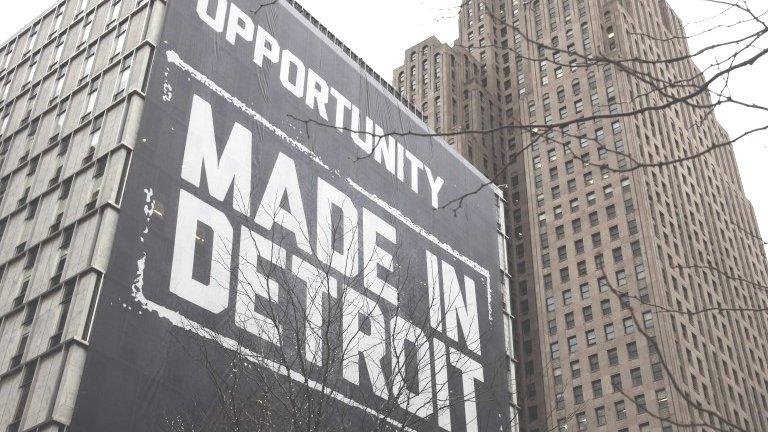'Sick outs' staged by teachers banned from striking
- Published
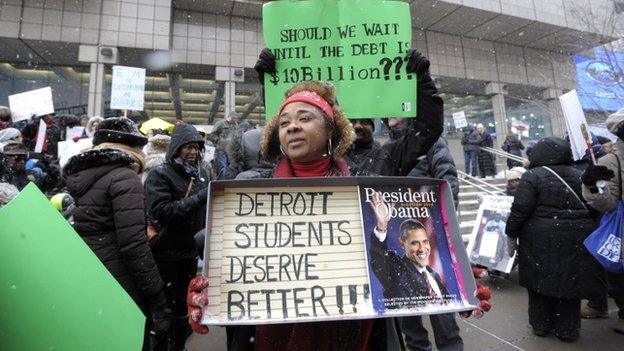
President Obama's visit to Detroit was met by protests over school funding
When is a strike not a strike? And when is it a lot of people not coming into work on the same day?
Detroit, a US city in the state of Michigan where it is illegal for teachers to strike, has seen a wave of school closures, when large numbers of teachers have called in sick.
Last week, 88 out of about 100 state schools in the city were shut for a day by teachers not coming in. On another day this month, 60 schools were affected, keeping tens of thousands of pupils out of the classroom. There were some more schools closed again at the beginning of this week.
These so-called "sickouts" have angered legislators who thought such disruption was illegal.
In Michigan, it is unlawful for teachers in state schools to go on strike, which is defined as "concerted failure to report for duty, the wilful absence from one's position".
'Dummy mission'
But where does the law stand if lots of teachers phone in to say they're not well? And what happens if such sickouts are not conventional strikes by a trade union but protests by a grassroots social-media campaign?
Republicans in Michigan are proposing changes to the law to take a tougher line on anyone promoting such mass absences, including bigger fines and ways to have hearings against more than one teacher at a time.
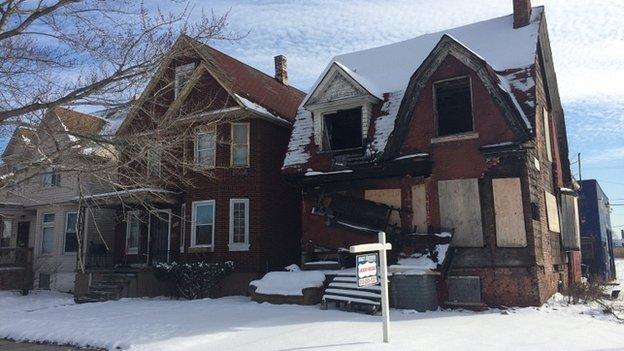
Detroit's population has halved, leaving houses empty and cutting numbers in school
There have also been attempts to use the courts to stop the sickouts, with Detroit Public Schools saying such school closures are unacceptable, with seven school days already lost.
But, this week, a court rejected calls for a restraining order, finding there was not enough evidence to prove teachers' unions had organised staff not to come in to school.
This unofficial industrial dispute has left the school district having to use its Facebook page to tell parents at short notice which schools are not going to open because of "high teacher absences".

More stories from the BBC's Knowledge economy series, external looking at education from a global perspective and how to get in touch

One parent posted she had already sent her child to school, before finding it wasn't going to open.
"These warnings need to be made at 04:00," she wrote.
"I work in the morning myself, and everybody doesn't drive to work. It's too cold out here for this dummy mission I just sent my child on."
'Shameful conditions'
The school closures are the latest stage in a dispute about pay and what teachers say are the terrible conditions in Detroit's schools, with overcrowded, crumbling, unhygienic classrooms and chronic underfunding.
When US President Barack Obama attended a motor show in the city this month, the Detroit Federation of Teachers marked the visit with protest leaflets saying teachers had to work in "shameful conditions", with photographs of dead mice and a rat.
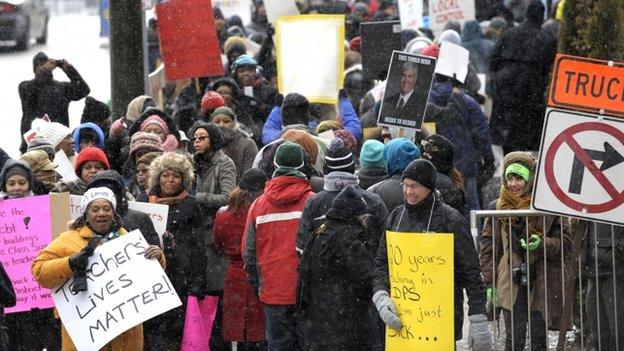
Teachers in Detroit say schools are in a terrible condition and need to be repaired
The sickouts have been condemned by Darnell Earley, emergency manager of Detroit Public Schools, who says pupils in the city can "ill-afford to lose instruction time".
He has also criticised how the school closures have been "orchestrated".
The city's Mayor, Mike Duggan, is also opposed to the teachers' sickouts.
Bu he has also said the poor condition of some schools "would just break your heart", with some pupils having to wear coats inside because it is so cold.
Michigan's strike ban on teachers has been in place for decades.
But teachers' unions say the current wave of unrest reflects that when there are serious problems, banning strikes is not an answer.
'Frustration'
"It clearly indicates that when people reach their limit they will take action," says David Hecker, president of the American Federation of Teachers in Michigan.
"The sickouts are a product of deep frustration and anger on the part of teachers," says Mr Hecker.
"In a certain sense, it is surprising they have not happened sooner."
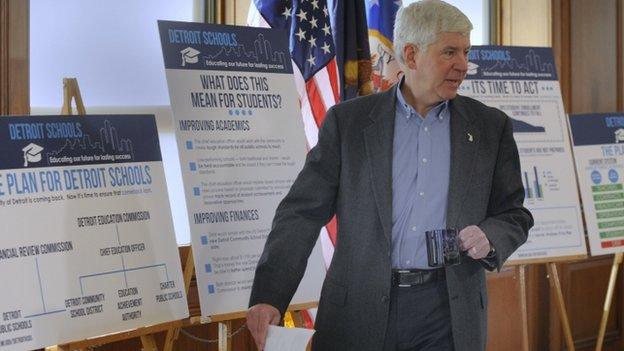
Michigan's Governor, Rick Snyder, says Detroit's schools are in crisis
He says the protests have highlighted the "deplorable condition" of school buildings, inadequate funding levels and poor pay, but it's the "teachers who are always blamed".
What isn't in dispute is that the Detroit school system is in trouble, both in its finances and results.
The teachers are staging the sickouts, but it is the school system that is in need of urgent treatment.
Last week, Michigan's Republican Governor, Rick Snyder, described the Detroit Public School system as "in crisis", with debts of $515m (£360m).
It meant money that should be repairing buildings or paying teachers was being used to service debts, to the level of $1,100 (£770) per year for every student.
Worst results in US
According to the annual Nation's Report Card, only 4% of 13- to 14-year-olds in Detroit schools are proficient or better at maths and 7% for reading.
These are far below average and the worst figures for any major US city.
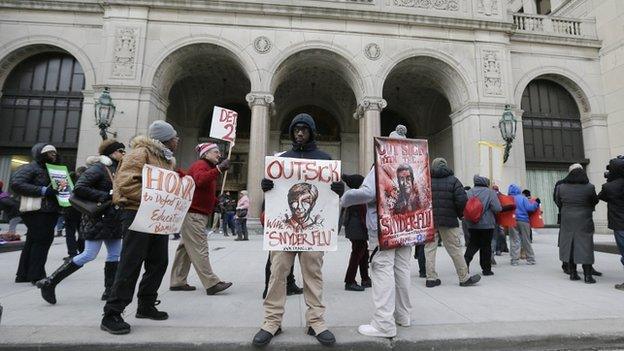
Protesters gathered outside a court this week, where a legal action was taken against the sickout
Detroit has become one of the highest-profile examples of US cities struggling with industrial decline, with its population falling by more than half since the 1970s.
The number of students in the Detroit Public School system has fallen even more sharply, down by about 80% compared with the 1970s.
As well as the collapse in the local population, pupils have been moving to publicly funded but independent "charter schools".
And there have been other schools created by an intervention to replace those that are failing.
Governor Snyder has announced a commission to examine ways to improve education and wants to relaunch the city's schools - saying after decades of malaise they urgently need to be turned around.
He said: "We have a 19th Century education system in the 21st Century. It's time to ask ourselves why?"
- Published20 January 2014
